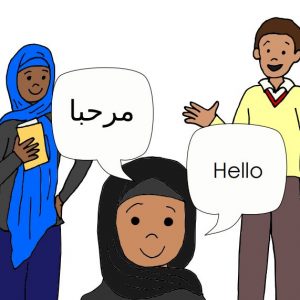 Learning two languages in childhood does not cause confusion or language delay
Learning two languages in childhood does not cause confusion or language delay
Some people may mistakenly believe that raising a child in a bilingual or multilingual household (meaning they speak more than one language) puts them at risk for language delays. Language delays can still occur in bilingual children, but bilingualism itself is not the cause.
The idea that two languages causes language delays in children has been a long-standing myth in English communities. However, research has dispelled this myth. Children are able to learn two languages at the same pace as other children who are learning only one language.
All children can learn more than one language, even if they have a developmental delay or other diagnosis
Thankfully, the facts about bilingualism and how bilingual children’s languages develop are becoming more widely known. Some professionals continue to tell parents to drop a language when their children are experiencing speech and language or developmental delays. However, we now know all children can be given the opportunity to be bilingual. This applies to families that use a language other than English in their home, or families that are choosing to pursue additional language programs in school, such as French immersion.
Bilingualism does not cause confusion or language delay, even if the child has a developmental delay or another diagnosis such as Autism Spectrum Disorder or Down Syndrome. Current research overwhelmingly shows that speaking to children with these diagnoses in two or more languages does not result in additional language or social delays.
Just like monolingual children, bilingual kids may also have speech and language–related challenges
As with all children, families of bilingual children need to be aware of potential speech and language delays. These elays can exist just like with monolingual children, but they are not due to multilingualism in the family. Children who have delayed language development would be delayed regardless of whether they are monolingual or multilingual.
If you are concerned, discuss your observations about your child’s linguistic abilities with a speech-language pathologist to determine whether further assessment would be beneficial.
What can bilingual parents do to help their child?
- Speak to your child in the language you’re most comfortable with. Parents who avoid using their native language to try to reduce the number of languages the child is exposed to may make it harder for a child to learn any language well. This is because it may limit the overall quality and quantity of language exposure that the child is receiving at home. Multilingual families should speak to their child in the language in which they feel the most comfortable.
- Children learn language from hearing language. Everyday routines such as mealtimes, bath time, getting dressed, and playtime are all great opportunities for talking, teaching, and learning vocabulary in either language.
- Repeat, repeat, repeat. Children need to hear new words hundreds of times before they begin to use them. A parent can repeat the word they want their child to learn in a simple sentence while showing them what it means.
- Be a language model, not a language enforcer. When a child uses grunts or gestures instead of words or uses an incorrect word or grammar, simply model the correct word or sentence instead of correcting them. Avoid demanding that the child say something – instead, show them what to say through modeling.
- Build on their language. Repeat what the child says and add an extra word to the sentence to help them learn what they can say the next time. For example, if the child says “more” to ask for more juice, the parent can respond, “more juice!” Then repeat the phrase several times.
- Be patient. Every child is unique and learns language gradually. Most bilingual children will fluctuate in which language they use and how well they use it. Encourage the child to continue communicating in whichever language they are most motivated to use.
If the child continues to have difficulty in their first language or learning more language, discuss your concerns with a speech–language pathologist.
If you would like to download this page as a handout click here..
Useful Websites
Bilingualism in Young Children: Separating Fact from Fiction
Strengthening Your Child’s Control Centre: How Bilingualism Boosts Executive Functioning
Helping Children Learn English as a Second Language
Can Children With Language Impairments Learn Two Languages?